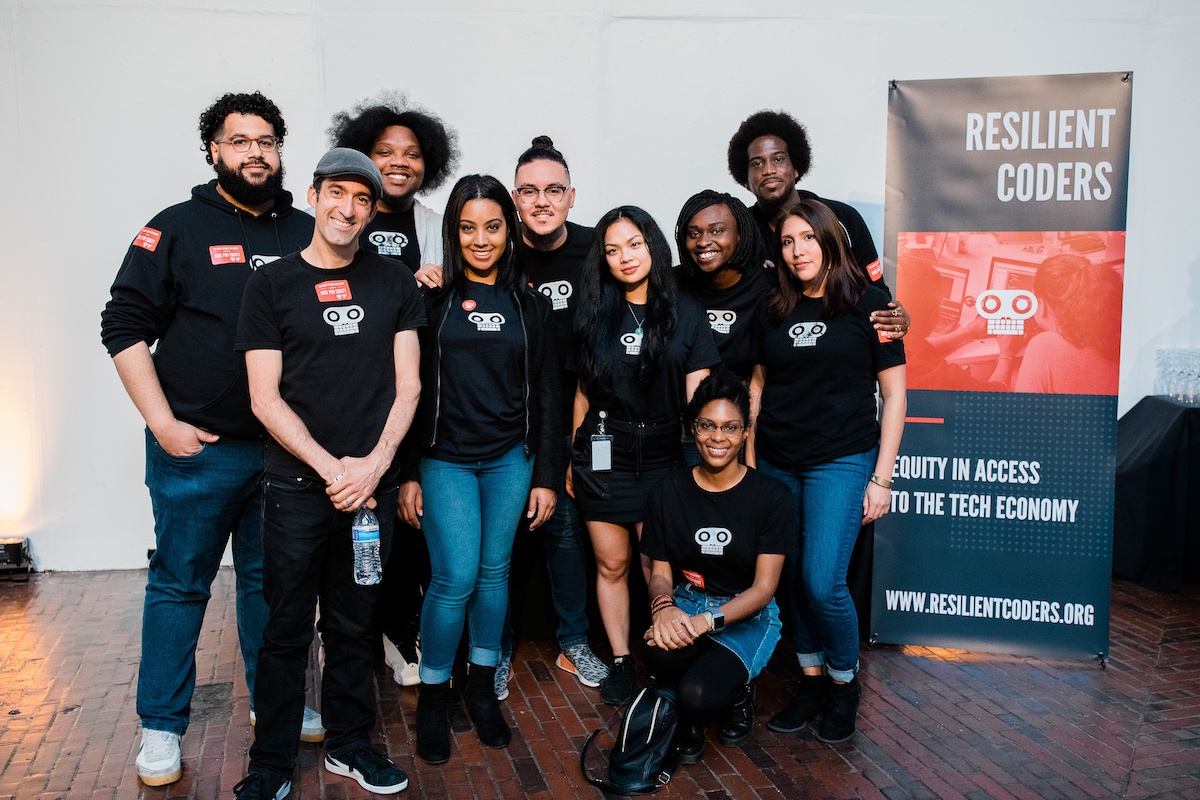A coding bootcamp with equity as its mission is coming to Philadelphia.
Six-year-old, Black and Latinx-led nonprofit Resilient Coders, based in Boston, will begin its Philly expansion next month with a pilot class of 10 students. Over 20 weeks, students are taught HTML, CSS, JavaScript, jQuery, React, Node and MongoDB, as well as soft skills, at no cost. The bootcamp reports high success for its grads, all of which are people color: In 2019, 85% of the program’s graduates found jobs averaging $90,000 in salary within six weeks of graduation, it said.
Resilient Coders’ managing director of engineering, Leon Noel, will lead the expansion. Noel is a native of South Philadelphia and grew up aware of the city’s unemployment gap that has existed for decades now. As a student at George Washington Carver High School of Engineering and Science 15 years ago, he had two years of C++ classes and said that while the ability to train individuals in tech jobs is not new, diverse communities are still missing out.
“It’s patently wrong when you have such a vibrant tech economy and in communities of color you’re seeing double-digit unemployment,” he told Technical.ly. “With COVID, it’s only accelerating. We saw how fragile jobs prevalent in our communities of color are.”

Noel joined Resilient Coders in Boston and found insightful similarities between the city and his hometown. Both cities have thriving tech communities and are also beset by racial inequality. Over four years, Noel found that giving participants with no tech experience the skills they need in 20 weeks is enough to allow them to earn an average starting salary of $98,000.
Noel believes that a “perfect storm” has emerged in Philadelphia as tech giants like Comcast have large capacity for new talent, and diverse communities have an immense number of individuals ready to learn new skills.
By providing a free program, Resilient Coders allows program participants to gain skills without needing to navigate the costs typically associated with job training or higher education. Noel said participants are also asked to bring three more new people to the program after they graduate as a way of helping to build more diverse communities within the tech industry.
“When people get that first job, all we ask that student is that they turn around and bring three more [people],” Noel said on Friday. “Resilient Coders is a movement of individuals building communities of color. We’re about to have graduation in an hour and 11 of 16 students already have jobs. When we talk at graduation later, we’re going to ask them to pay it [forward].”
Resilient Coders CEO David Delmar Sentíes, a former technical lead at PayPal, is an advocate for cost-free education and believes that making the program free for participants is a step in the right direction. With America’s stratification of wealth, he believes corporations can play a significant role in ameliorating the country’s debt crisis. Resilient Coders is funded through individual, corporate and philanthropic donations, including from the likes of the Cambridge Innovation Center and the JPMorgan Chase Foundation.
“Income-sharing agreements are another way of saying debt,” he said of bootcamps that charge less-than-full-price tuition but ask their grads to pay back the full cost of the program once they’re employed.
In addition to preparing local talent for tech careers, Sentíes has plans for Resilient Coders to partner with local equity-minded organizations with an aim to create a culture conducive for the success of diverse technologists. (Some we have in mind: Code for Philly and the Philadelphia Tech Industry Partnership.)
A transition into remote work earlier in the pandemic will help Resilient Coders expand more easily to Philadelphia. Noel said the program has already completed two training cycles online, and that remote work is allowing Resilient Coders to expand without needing to consider brick-and-mortar locations. Expanding remotely will also allow Noel and his colleagues to better target individuals and communities impacted by the pandemic and provide opportunities that would not be otherwise accessible.

With no end to the pandemic in sight and economic recovery a long way off, too, Noel sees the work of Resilient Coders as an opportunity to train individuals for high-growth careers that will be automation resistant. Connecting diverse communities to opportunities in a booming local tech economy could also possibly build a sustainable pipeline for communities of people that have been struggling for decades.
Noel and Sentíes were enthusiastic when discussing the success of a recent Resilient Coders alum. After going through the program, this new engineer was scooped up by a large Boston tech company and nine months later joined its hiring committee. A long-term goal of the organization is for its alumni to eventually form the committees that make hiring decisions and bring in more diverse talent.
Sentíes ultimately hopes for a future where programs like Resilient Coders are no longer necessary in bringing about change in the tech community and helping making society more equitable for people of color.
“If you take that one step further, you end up with situation where they don’t need us anymore,” he said. “My goal as an organization is to close down and become obsolete.”
There’s no application to join Resilient Coders. Instead, those interested must attend an organizational hackathon. Look for more details on Philly’s first recruitment event soon.







